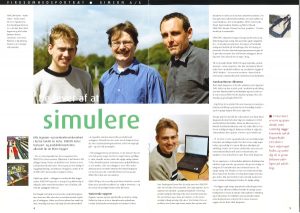Xcelgo celebrates 10 years of industry innovation
Xcelgo celebrates 10 years of industry innovation
In 2009, a small group of engineers and software developers, frustrated with delayed automation projects, decided to focus their efforts towards spreading the use of emulation in the industry. 10 years later, Xcelgo has emulated hundreds of automation projects around the world.
Queen Elizabeth called the new terminal “a 21st Century gateway to Britain” on the opening day of Terminal 5 at Heathrow Airport in 2008. However, during the new terminal’s first 10 days in operation, 42,000 bags failed to travel with their owners and 500 flights were canceled, resulting in a financial impact estimated to be around £16 million.
How could it go so wrong? The primary reasons were a number of problems with the terminal’s IT systems, mainly the control software of the baggage system that simply wasn’t tested thoroughly before the opening of the terminal.
Delays and frustrations
This is just one example of insufficient automation software testing. Around the same time of the chaotic terminal opening in the UK, a small group of engineers and software developers in Denmark witnessed the same challenges in automation projects, and they knew that emulation – or virtual commissioning – was the solution. This was the same core team that would become Xcelgo in 2009.
”From the sideline, we could see how hard it was to test software for automation systems thoroughly, and time after time projects were delayed. It was frustrating to witness,” says Bent Aksel Jørgensen, the CEO of Xcelgo.
The company, called Simcon back then, worked mainly with 3D simulation of automation systems, but in their work in industry they got their first experiences with 3D modelling for emulation. Click here to learn about the differences between simulation and emulation.
“Many of our customers had too high expectations of what is possible with simulations. They thought it was some kind of wonder cure to all of their problems. Instead, we started to look towards using emulation and 3D models along the life cycle of automation systems,” Bent Aksel Jørgensen says.
From Simcon to Xcelgo
The guys at Simcon actually started experimenting with integrating 3D models for emulation 20 years ago. Throughout the years, they used several different software tools, but they couldn’t get it to work the way they wanted.
“We couldn’t find a tool on the market that met our requirements for flexibility, agility and ease of use, so back in 2004 we started developing the 3D software platform that is now Experior,” says Bent Aksel Jørgensen.
Back then, emulation was however still not very common in Denmark, as it was seen as an expert tool not applicable for most companies. But with their experiences from the industry and a good idea, the team secured some early contracts for emulation projects.
“Our first emulation customers were so frustrated over all the challenges they experienced in their automation projects that they were willing to bet on us. It was a great opportunity for us to prove the benefits from emulation, and we succeeded,” Bent Aksel Jørgensen says.
With their own software tool and their first successful experiences with real emulation projects, the guys decided to change the direction of the company to focus mainly on emulation with their own software tool. That’s when they changed name from Simcon to Xcelgo in 2009 to mark the turning point for the company.
Close customer relationships
From Simcon to Xcelgo
One of Xcelgo’s first big emulation projects was with the Swedish auto giant Volvo, and together with a handful of other close customers including Tricon, Crisplant (now BEUMER Group), Danish Crown and JYSK, they made up the core customer group in Xcelgo’s first years.
According to Bent Aksel Jørgensen, these customers have been essential to the success of Xcelgo and the software platform Experior:
“Our first customers helped us mature the software and the emulation process, both equally important in a successful emulation project. Since then, we’ve always had a close relationship to our customers,” Bent Aksel Jørgensen says.
Our first customers helped us mature the software and the emulation process, both equally important in a successful emulation project
These customer relationships have meant that Xcelgo has always had a direct line to essential insights into what’s actually needed in the industry.
“The professional intimacy with our customers has helped us create a very applicable tool, because we’ve been able to utilize our ingenuity in relation to challenges that companies actually experience out there in the real world,” says Bent Aksel Jørgensen.
The future of 3D modelling in automation
These challenges have changed throughout the years, and Xcelgo has experienced an increasing focus on software as the differentiator in automation projects.
“Back in the day, focus was mainly on the hardware – the cranes, conveyors etc. – but now software is the crucial difference, making automation systems more flexible, effective and responsive,” Bent Aksel Jørgensen says.
To accompany the importance and complexity of automation software, Xcelgo have developed a tool that can handle multiple tasks along the life cycle, including both high level and low level emulation, classic simulation, VR/AR and Digital Twins.
“With decades of experience in virtual commissioning and now Digital Twins, we are ready to help more companies utilize modern 3D technologies to their benefit” says Bent Aksel Jørgensen.
Today, Xcelgo has 15 employees and offices in Denmark, Germany and the USA.


